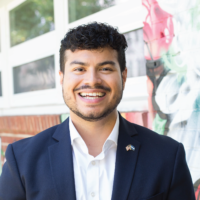January 26, 2022
Covering All Kids in 2022: 13,000 Children Shouldn’t Have to Wait Another Year
Every child in Virginia should have access to affordable and comprehensive health coverage. Yet many barriers stand in the way of covering all kids. Roughly 96,500 (4.9%) children in Virginia do not have health coverage, according to 2019 Census data, and there are stark differences in coverage based on immigration status and family income. While there’s been some recent improvement in children’s insurance rates in Virginia, the state still ranks 25th in the nation for the percentage of children who lack health insurance. We can do better. State lawmakers should implement solutions to eliminate these barriers and help Virginia address disparities in coverage, become a national leader in children’s health coverage, and demonstrate a commitment to investing in every child’s healthy future.
Current Health Coverage Landscape for Undocumented Children
Children who are citizens have an uninsured rate of 4.1%. In comparison, non-citizen children with undocumented status in Virginia are estimated to have an uninsured rate of 48%.
Family income is also a significant factor for health coverage. Roughly 9,000 undocumented children in families with low incomes — under 200% of the federal poverty level (FPL, or $46,060 for a family of three in 2022) — are uninsured, with another 4,000 likely underinsured according to The Migration Policy Institute.
Families with undocumented children have few avenues to sign up for affordable and comprehensive health coverage. Federal law prohibits these families from accessing coverage through Medicaid, the Children’s Health Insurance Program (CHIP), and the Affordable Care Act (ACA) marketplace. There are a few exceptions, such as Emergency Medicaid for severe and life-threatening medical emergencies and prenatal coverage for pregnant people. Employer-based coverage options can be limited, especially if the employment is in low-wage or seasonal work where health coverage is often not offered or is unaffordable.

Families are asked to rely on a patchwork health safety net system but often find that accessing these resources difficult or impossible. This was the case for a 4-year-old from Northern Virginia who could not get her medication and medical needs met due to her medical history, and is an example of why these options are especially ill-suited to meet the needs of people with complex conditions. (Read her story here.)
This lack of affordable and comprehensive health care often results in medical avoidance due to fear of costly medical bills. Delaying care can result in avoidable yet expensive visits to the emergency department for the family and child, creating financial hardship. Weighing the costs of a child’s health care needs and household essentials like rent and food is a decision that no family should have to make.
An Opportunity in 2022
Thankfully, Virginia lawmakers can address this issue during the 2022 legislative session. Del. Tran and Sen. McClellan have each introduced a bill (House Bill 1012 and Senate Bill 484, respectively) to create a state-funded health coverage option. The program mirrors Virginia Medicaid/FAMIS enrollment and eligibility processes and includes enhanced data privacy considerations. The program also matches CHIP/FAMIS income eligibility levels, currently at 205% FPL (or $47,211 for a family of three in 2022). This policy change would offer an affordable health coverage option to almost 1 in 10 (9.3%) uninsured children in Virginia.
Benefits would be the same as Medicaid/FAMIS to provide newly eligible children the full opportunity to meet their health care needs. Services include behavioral health, dental, and preventative care services. Language access, privacy protections, and a robust outreach and enrollment plan are included in the bill language to ensure the program is accessible and practical. These thoughtful additions will be essential to remove any potential stigma and create a welcoming experience for people who may enroll in the program.
A recent Secretary of Health and Human Resources workgroup draft report estimates the program would offer a new coverage option to roughly 13,000 low-income and currently uninsured or underinsured children who can’t access Medicaid, FAMIS, or ACA marketplace coverage due to their immigration status.
Estimates on state savings for this program are difficult to calculate due to a lack of data on current utilization of programs like Community Health Centers, Community Service Boards, and charity care by undocumented children in Virginia. However, it’s important to note that the state and localities would likely see savings in their budgets due to a lower number of uninsured children accessing care through the publicly funded healthcare safety net. Hospitals and healthcare systems in Virginia would also likely benefit by seeing a reduction in charity care and uncompensated care currently being delivered to undocumented children. A stronger emphasis on preventative and primary care could help to reduce the need for more costly care and reduce the need for state investment.
Benefits for All of Virginia
While this program is a targeted initiative to break down the barriers that too many undocumented children face to enroll in and access health coverage, this program would benefit all children and families who call Virginia home. Expanding eligibility for children’s health coverage will allow for a simplified message for the state to share with families: “All children from low-income families in Virginia have access to affordable and comprehensive health coverage.”
This simplified message may encourage more families of lawfully residing children and mixed-status families to enroll in health coverage. These children are already eligible for Medicaid/FAMIS in Virginia, but confusion surrounding the programs’ immigration requirements or the lingering effects of the Trump-era Public Charge Rule could dampen enrollment. This more straightforward message will also help other families learn about and enroll in health coverage.
Conclusion
Virginia would not be alone in creating a health coverage option for children regardless of immigration status. A total of 10 states (CA, IL, MA, NY, OR, WA, NJ, CT, VT, and ME) and the District of Columbia currently use or plan to use state-only funds to cover income-eligible children in Medicaid/CHIP who are otherwise ineligible due to immigration status.
State lawmakers should take action this legislative session to make sure that 13,000 children don’t have to spend yet another year without adequate medical care. Legislators have the tools and the financial resources to establish Virginia among national leaders in children’s health coverage for all. Del. Tran’s HB 1012 and Sen. McClellan’s SB 484 offer an opportunity to address disparities in children’s health coverage and prove that Virginia invests in EVERY child’s future.
Categories:
Budget & Revenue, Health Care
